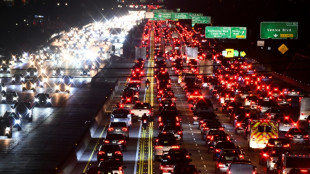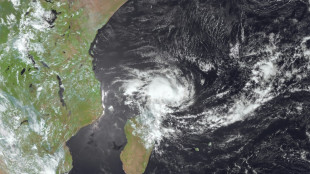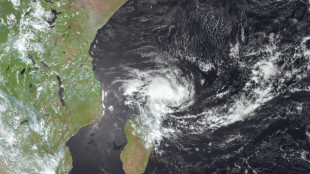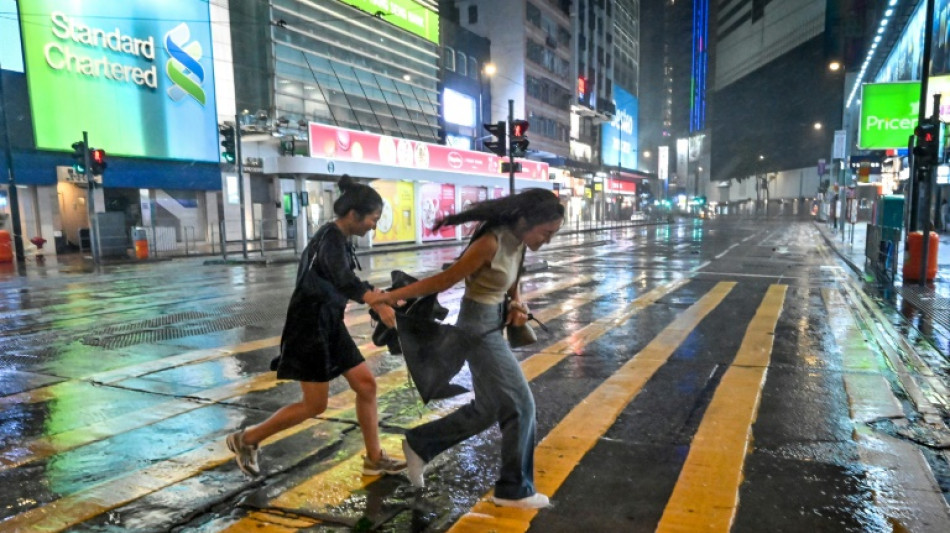
-
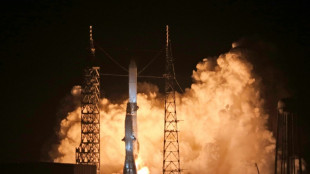 Blue Origin's New Glenn rocket blasts into orbit for first time
Blue Origin's New Glenn rocket blasts into orbit for first time
-
UK economy rebounds but headwinds remain for govt

-
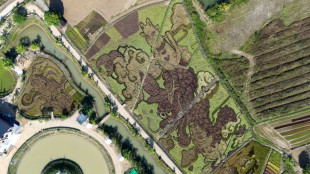 Rice fields turned into art in northern Thailand
Rice fields turned into art in northern Thailand
-
Stocks follow Wall St higher on welcome US inflation data

-
 South Korea's president arrest: what happens next?
South Korea's president arrest: what happens next?
-
Blue Origin's New Glenn rocket blasts off in first launch, reaches orbit

-
 Chinese give guarded welcome to spending subsidies
Chinese give guarded welcome to spending subsidies
-
World Bank plans $20 bn payout for Pakistan over coming decade

-
 Indian Bollywood star Saif Ali Khan stabbed in burglary
Indian Bollywood star Saif Ali Khan stabbed in burglary
-
Taiwan's TSMC says net profit rose 57% in fourth quarter

-
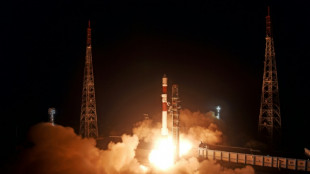 India achieves 'historic' space docking mission
India achieves 'historic' space docking mission
-
South Korea's Yoon avoids fresh questioning after dramatic arrest

-
 Olympic push for kho kho, India's ancient tag sport
Olympic push for kho kho, India's ancient tag sport
-
Dangerous Fritz sets up Monfils clash at Australian Open

-
 AFP photographer's search for his mother in the Nazi camps
AFP photographer's search for his mother in the Nazi camps
-
Life after the unthinkable: Shoah survivors who began again in Israel

-
 Israeli cabinet to vote on Gaza ceasefire deal
Israeli cabinet to vote on Gaza ceasefire deal
-
Jabeur finds it 'hard to breathe' as asthma flares up in Melbourne

-
 Swiatek powers on as Sinner, Medevedev top men's Melbourne bill
Swiatek powers on as Sinner, Medevedev top men's Melbourne bill
-
Nintendo rumour mill in overdrive over new Switch

-
 Biden warns of Trump 'oligarchy' in dark farewell speech
Biden warns of Trump 'oligarchy' in dark farewell speech
-
Superb Swiatek sets up Raducanu showdown at Australian Open

-
 Asian stocks follow Wall St higher on welcome US inflation data
Asian stocks follow Wall St higher on welcome US inflation data
-
Toyota arm Hino makes deal to settle emission fraud case

-
 Fire-wrecked Los Angeles gets a break as winds drop
Fire-wrecked Los Angeles gets a break as winds drop
-
Superb Swiatek races into third round at Australian Open

-
 Biden warns of dangerous 'oligarchy' in dark farewell speech
Biden warns of dangerous 'oligarchy' in dark farewell speech
-
Herbicide under US scrutiny over potential Parkinson's link

-
 South Korea's Yoon to avoid fresh questioning after dramatic arrest
South Korea's Yoon to avoid fresh questioning after dramatic arrest
-
Behind the Gaza deal: a US odd couple and last-minute snags

-
 Noisy racket on Australian Open 'party court' forces match move
Noisy racket on Australian Open 'party court' forces match move
-
AFP strikes deal for France's Mistral AI to use news articles

-
 'Sensational' Arsenal back in title race: Arteta
'Sensational' Arsenal back in title race: Arteta
-
Survivors count the mental cost of Los Angeles fires
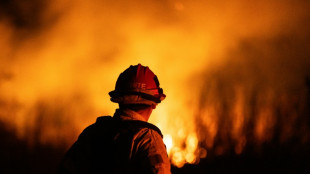
-
 Arsenal reignite Premier League title charge as Isak stars again
Arsenal reignite Premier League title charge as Isak stars again
-
Thousands across Gaza celebrate ceasefire deal

-
 Postecoglou slams 'nowhere near good enough' Spurs after Arsenal defeat
Postecoglou slams 'nowhere near good enough' Spurs after Arsenal defeat
-
Moyes 'under no illusions' after defeat on Everton return

-
 Arsenal reignite Premier League title hopes as Isak stars again
Arsenal reignite Premier League title hopes as Isak stars again
-
Yamal drives dominant Barca past Betis into Copa del Rey quarters

-
 Arsenal fightback sinks Spurs to ignite title bid
Arsenal fightback sinks Spurs to ignite title bid
-
Qatar, US announce Gaza truce, hostage release deal

-
 US consumer inflation rises in December but underlying pressures ease
US consumer inflation rises in December but underlying pressures ease
-
McGregor accused of sexual assault in civil suit

-
 Inter's title defence slowed by draw with spirited Bologna
Inter's title defence slowed by draw with spirited Bologna
-
Isak fires Newcastle into Premier League top four, Moyes misery

-
 Sane hits brace as Bayern thump Hoffenheim
Sane hits brace as Bayern thump Hoffenheim
-
Aston Villa ruin Moyes' Everton return

-
 Norman replaced as CEO of LIV Golf
Norman replaced as CEO of LIV Golf
-
SpaceX delays latest Starship megarocket test to Thursday
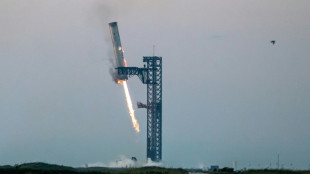

Typhoon Saola slams southern China after battering Hong Kong
Typhoon Saola roared ashore in southern China early Saturday as a weakened but still dangerous threat that has lashed Hong Kong and forced millions to hunker down for one of the region's strongest storms in decades.
Tens of millions of people across Hong Kong, Shenzhen and other southern Chinese megacities had braced for the menace of a cyclone rated as a super typhoon.
And while it delivered a fierce but glancing blow to the special administrative region, Saola -- now downgraded to a severe typhoon -- landed south of Hong Kong with its toughest blows.
China's National Meteorological Center said Saola made landfall at around 3:30 am Saturday (2030 GMT Friday) to the south of the city of Zhuhai in Guangdong province, south of casino hub Macau.
Over 880,000 people were evacuated across two Chinese provinces ahead of Saola making landfall, hundreds of flights were cancelled across the region, and trees were uprooted around the rain-battered streets of Hong Kong.
China's national weather office predicted Saola "may become the strongest typhoon to make landfall in the Pearl River Delta since 1949", referring to a low-lying region that includes Hong Kong, Macau and much of Guangdong province.
With a direct hit possible, authorities in Hong Kong had raised the warning level Friday evening to the city's highest -- "T10" -- which had only been issued 16 times since World War II before Saola.
By 3:40 am, after more than seven long hours under T10, Hong Kong downgraded to level T8. But with dangerous gusts up to 139 kilometers (86 miles) per hour they urged residents to remain vigilant.
"As gales and violent squalls are still occurring in places, precautions should not yet be relaxed," the Hong Kong Observatory warned in a bulletin.
Still that marked a downgrade from 11:00 pm Friday, when Saola was just 30 kilometres south-southwest of the city, and packing sustained wind speeds of 185 kilometres per hour.
Hong Kong residents struggled with flailing umbrellas as they ran under the unrelenting rainfall, while people wearing plastic bags on their heads rushed home past sandbags stacked in waterfront areas to prevent flooding.
The observatory said "the maximum water level may reach a historical record", warning that "there will be serious flooding".
The last time Hong Kong issued a T10 warning was in 2018, when Typhoon Mangkhut slammed into the city, shredding trees and unleashing floods, and leaving more than 300 people injured.
In mainland China, Mangkhut killed six people and impacted the lives of more than three million others.
Across the mainland border in neighbouring Guangdong province, authorities evacuated more than 780,000 people from high-risk areas, while eastern Fujian province saw more than 100,000 moved to safer ground.
Trains in and out of Guangdong were also suspended until 6:00 pm Saturday, while the national flood defence agency raised its emergency response for prevention to its second-highest level.
"It's going to affect our life," said Wu Wenlai, 43, who had to close his restaurant in a Shenzhen suburb.
"My eldest son was planning to fly to Chengdu today for university and his flight has been cancelled now."
- More intense typhoons -
Southern China is frequently hit in summer and autumn by typhoons that form in the warm oceans east of the Philippines and then travel west.
Climate change has increased the intensity of tropical storms, with more rain and stronger gusts leading to flash floods and coastal damage, experts say.
In Hong Kong, authorities received at least seven confirmed cases of flooding, as well as nearly 40 reports of downed trees. The city's hospital authority reported seven people seeking medical treatment during Saola.
Businesses taped up their glass displays and windows, while high-rise buildings swayed under the whipping gusts.
In eastern Heng Fa Chuen -- a coastal residential area and the site of devastation during 2018's Typhoon Mangkhut -- officers in orange vests urged storm-watchers to go home, as trees leaned sideways from the heavy gusts.
In the low-lying fishing village of Lei Yue Mun, which is prone to flooding, water seeped into shops, prompting residents to set up sandbags and board up doors.
burs-dhc/mlm/tjj
P.M.Smith--AMWN
